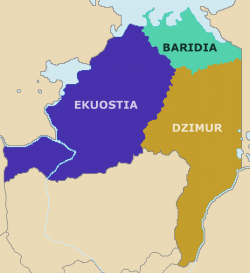Difference between revisions of "Baridia"
m |
|||
| (3 intermediate revisions by one other user not shown) | |||
| Line 100: | Line 100: | ||
}} | }} | ||
'''Baridia''' ([[Baridus language|Baridus]]: ''Bárižgà'', [[Ekuostian language|Ekuosticized]] as ''Baraíske''), is one of the three | '''Baridia''' ([[Baridus language|Baridus]]: ''Bárižgà'', [[Ekuostian language|Ekuosticized]] as ''Baraíske''), is one of the three grand duchies of [[Barradiwa]], located chiefly in the country's northeastern reaches. With a population of 9 million people, Baridia is the least populous of the three Barradiwan duchies. Its capital and most populous city is [[Baridut]], which is also Barradiwa's fifth largest city. | ||
Baridia is the home of the [[Barid people|Barids]], a group of [[Termic peoples]] who settled the northeastern coastline of what is now Barradiwa during the [[Termic expansion]] around 2,000 years ago. In classical times, they were often subjugated by the [[Adzamasi Empire]]; in medieval times, they were one of the three "core" vassal states of the [[Ekuostian Empire]], and the last state to break away from the empire (having done so in 1486). They were then briefly ruled by the religiously-motivated conqueror [[Ignez]] before his death in 1501, and then Dzimur had a shot at ruling over the land. | Baridia is the home of the [[Barid people|Barids]], a group of [[Termic peoples]] who settled the northeastern coastline of what is now Barradiwa during the [[Termic expansion]] around 2,000 years ago. In classical times, they were often subjugated by the [[Adzamasi Empire]]; in medieval times, they were one of the three "core" vassal states of the [[Ekuostian Empire]], and the last state to break away from the empire (having done so in 1486). They were then briefly ruled by the religiously-motivated conqueror [[Ignez]] before his death in 1501, and then Dzimur had a shot at ruling over the land. | ||
The | The region is known for its vast exotic ruins and deep jungle habitats, as well as its high amount of linguistic diversity - despite being by far the smallest Barradiwan grand duchy, it contains approximately half of all languages spoken in the country. | ||
==Etymology== | ==Etymology== | ||
| Line 116: | Line 116: | ||
==Culture== | ==Culture== | ||
[[Category: | [[Category:Grand duchies of Barradiwa]] | ||
Latest revision as of 20:25, 30 January 2021
Baridia
Bárižgà | |
|---|---|
 A map displaying the three subregions of Barradiwa; Baridia is the northeast region marked in turquoise. | |
| Capital and largest city | Baridut |
| Languages | Baridus, Ekuostian |
| Population | |
| • Total | 9,002,652 |
| Demonym(s) | Barid |
Baridia (Baridus: Bárižgà, Ekuosticized as Baraíske), is one of the three grand duchies of Barradiwa, located chiefly in the country's northeastern reaches. With a population of 9 million people, Baridia is the least populous of the three Barradiwan duchies. Its capital and most populous city is Baridut, which is also Barradiwa's fifth largest city.
Baridia is the home of the Barids, a group of Termic peoples who settled the northeastern coastline of what is now Barradiwa during the Termic expansion around 2,000 years ago. In classical times, they were often subjugated by the Adzamasi Empire; in medieval times, they were one of the three "core" vassal states of the Ekuostian Empire, and the last state to break away from the empire (having done so in 1486). They were then briefly ruled by the religiously-motivated conqueror Ignez before his death in 1501, and then Dzimur had a shot at ruling over the land.
The region is known for its vast exotic ruins and deep jungle habitats, as well as its high amount of linguistic diversity - despite being by far the smallest Barradiwan grand duchy, it contains approximately half of all languages spoken in the country.
